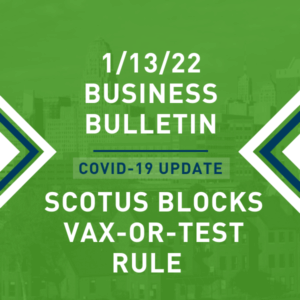BNP Advocacy Insider – September 2021
Blog Categories
September 7, 2021

Hochul Takes Oath, BNP Offers Recommendations for First 100 Days
In the wake of former Gov. Andrew Cuomo’s resignation, Kathy Hochul became the 57th Governor of the State of New York. BNP President and CEO Dottie Gallagher sent Hochul a welcome letter to Governor Hochul and recommended actions Hochul should take in her first one hundred days in office.
Read Gallagher’s letter to Hochul here.
Hochul Triggers NY HERO Act
Gov. Kathy Hochul designated COVID-19 as a “highly contagious communicable disease,” triggering the NY HERO Act. Every private employer will now need to implement certain public health protocols in their workplaces. To learn what is required of your organization, visit our blog.
Bipartisan Infrastructure Bill Would Create Jobs, Opportunities
The U.S. Senate recently passed the bipartisan infrastructure bill, which would invest $1.2 trillion. The bill is now being considered by the House with a vote expected in late September.
Speaker Pelosi has maintained that she does not want to bring the bipartisan infrastructure bill until the Senate also passes a $3.5 trillion social spending package.
The BNP expressed to Congress our support for the bipartisan infrastructure bill and urged them to advance it regardless of progress on the social spending bill.
For more information on the bill, visit our blog.
Against Advice of BNP & North Border Chambers, Biden Extends Closure
The BNP has joined chambers in Green Bay (WI) , Detroit (MI) , Duluth (MN), Lake Champlain (VT), and the North Country (NY) in calling on the Biden administration to end the ban on Canadian travelers. The letter can be found here.
The Biden administration again ignored the advice of the BNP, other chambers, and members of Congress from both parties by extending the ban to September 21. The BNP will remain active on this issue.
Hotel & Commercial Conversion Bill Signed Into Law
In the final days of his tenure, Governor Cuomo signed the Housing Our Neighbors with Dignity Act (HONDA) into law. The law authorizes the state to purchase “distressed” hotels and commercial properties and convert them into affordable housing options.
This program will be subject to state appropriation. The 2021 budget includes $100 million for this program, and the BNP expects this issue to be a sticking point in future budget negotiations. Learn more about HONDA here.
A new federal proposal also aims to convert underutilized commercial properties into housing. The Revitalizing Downtowns Act would provide a tax credit for redeveloping office or commercial space into residential space. The BNP recently submitted a memo in support for the Revitalizing Downtowns Act.
BNP Offers Testimony at Climate Roundtable
In August, members of the State Legislature hosted a roundtable to discuss the potential impacts of the proposed Climate and Community Investment Act. This bill would increase taxes on gasoline and other fuel sources.
BNP Director of Economic Development Seth Piccirillo offered testimony at this hearing, noting the disastrous impact this legislation would have. He discussed analysis from Upstate United, which found that the Act would increase the cost of gasoline by 55 cents per gallon. Additionally, Piccirillo noted that enacting this legislation before the Climate Action Council releases its policy recommendations would be premature.
BNP Hosts Capital Conversation on ARP Windfall Spending
In August, the BNP was joined by the Empire Center’s Peter Warren for a Capital Conversation: How to Spend a Windfall. The American Rescue Plan is providing billions to state and local governments. In this event, we discussed pitfalls that municipalities should avoid when spending this windfall. The main takeaway: this one-time cash infusion should be spent on targeted, one-time projects, not on permanent expenditures that will need to be backfilled when ARP funds run out.
The presentation can be viewed here.
BNP and Great Lakes Chambers Support Place-Based Immigration
The BNP joined our partners in the Great Lakes Metro Chambers Coalition in supporting Congressional proposals for place-based immigration visas. Place-based visas, or PBVs, allow holders to compete on the open labor market in designated areas of the country. In contrast to H-1B visas, which rely on employer sponsorship, PBVs are contingent upon holders maintaining employment or starting a business in specific areas of the country. GLMCC called for a pilot program would allow for the annual admission of 10,000 admissible immigrants whose employment is essential to the economic development strategies of the cities or counties in which they will live or work.
Related Posts
2.9.22 COVID-19 Bulletin: Hochul Ends Mask Mandate; Poloncarz Will Follow Suit
Today, Governor Kathy Hochul announced she will NOT be renewing the state’s mask mandate, so the mandate will expire tomorrow.
1.28.22 COVID-19 Bulletin: Hochul Extends Mask Mandate
Today, Gov. Kathy Hochul extended the state’s mask mandate for indoor public places through February 10th. The mandate was previously set to expire on Tuesday.
1.13.22 COVID-19 Bulletin: SCOTUS Blocks Vax-or-Test Rule
This afternoon, the U.S. Supreme Court blocked OSHA’s emergency rule that required employees at workplaces of 100 or more to be vaccinated against COVID-19 or test weekly.
1.7.22 COVID Bulletin: The Latest on Vax Mandates – OSHA Rule to be Enforced Monday
OSHA is set to begin enforcement of its Vax-or-Test Mandate for organizations with 100+ employees on Monday. After months of litigation, the latest U.S. Circuit Court decision upheld the mandate.




